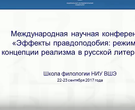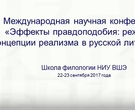- A
- A
- A
- АБB
- АБB
- АБB
- А
- А
- А
- А
- А
- Национальный исследовательский университет «Высшая школа экономики»
- Факультет гуманитарных наук
- Школа филологических наук
- Мероприятия
- Круглый стол «Культурный трансфер»
-
Школа
- О школе
- Сотрудники
- Образовательная деятельность
- Научные семинары школы
- Аспирантская школа по филологическим наукам
- Майнор "Инструменты эффективной коммуникации"
-
Проекты школы
-
- Летопись жизни и творчества Б.Л. Пастернака
- Большой проект «Русская литература в социальном измерении: компьютерная платформа СОЦИОЛИТ»
- Всеволод Некрасов. Литературный архив
- Большой проект «Речевые практики»
- Трансформация коммуникативной модели в эго-текстах русского модернизма
- Сравнительное изучение метрического стихосложения на фоне языковой просодии: цифровая аналитическая платформа “Прозиметрон”
-
- Майнор "История литературы"
-
Подразделения
- Лаборатории
- Научно-учебные группы
- Мандельштамовский центр
Адрес: 105066, г. Москва,
Старая Басманная ул., д. 21/4
Т. 1: Разделы I–XI. М.: Русский фонд содействия образованию и науке (Университет Дмитрия Пожарского), 2025.
Новое литературное обозрение. 2025. № 4. С. 76-92.
В кн.: Индоевропейское языкознание и классическая филология - XXIX (1). СПб.: Институт лингвистических исследований РАН, 2025. С. 425-430.
Адрес: 105066, г. Москва,
Старая Басманная ул., д. 21/4

Круглый стол «Культурный трансфер»
Дорогие коллеги!
16 ноября в 17. 30
В Школе филологии Факультета гуманитарных наук
в ауд. 502
состоится круглый стол: «Культурный трансфер»
в рамках круглого стола будут представлены два доклада:
Ханс-Юрген Люзебринк
(Saarland University, Saarbrücken, Germany)
Cultural Transfers and Globalization – theoretical concepts, methodological challenges, research paradigms
Юбер Ролан
(University of Louvain, Louvain-la-Neuve, Belgium)
Belgo-German cultural and literary transfer from one occupation to the other: a dialogue under constraint or a time of new opportunities?
язык выступлений – английский
Желающим прийти на лекцию, но не имеющим пропусков НИУ ВШЭ, необходимо заказать пропуск, написав на следующий адрес: puspenskiy@hse.ru
Краткая аннотация докладов:
Hans-Jürgen Lüsebrink (Saarland University, Saarbrücken, Germany)
Cultural Transfers and Globalization – theoretical concepts, methodological challenges, research paradigms
1.Cultural transfers – theoretical issues and major concepts Cultural transfers – an interdisciplinary field of research and investigation. 2.Cultural transfers – an interdisciplinary field of research and investigation. 3.Time -Intercultural challenges and cultural transfers of a universal category.
(1) In the first part will be introduced the major concepts of the cultural transfer approach – like ‘selection processes’, ‘mediators’, ‘adaptation’ and ‘productive reception’ - and the theoretical and methodological issues they are related to. (2) In the second part will be focused the variety of the field of research and investigation - and also teaching – covered by the cultural transfer approach. It reaches from the symbolic dimensions of material cultures (embracing for example public relations, marketing and advertising) to the different forms of symbolic representations, including literature, media and the arts which are analyzed – through the cultural transfer approach - in intercultural and transcultural perspectives. (3) Time is a universal category, but its concrete human perception and its agency are undergoing very significant historical and anthropological changes and transformations, through the establishment of calendars, the determination of historical periods and the structure of collective memory. The third part of the conference intends to analyze the cultural and intercultural implications of the representation and perception of time in various modern European and non-European societies with regard first to the culturally determined structures of calendars and time-periods; secondly with regard to the management of time in the everyday life of culturally different societies; and thirdly with regard to the process of cultural transfer of time frames, concepts and practices, as a result of the phenomenon of globalization where western societies played a predominant role since the end of the 15th century. The new calendar introduced during the French Revolution in 1792 and the perception of time in modern African societies, as reflected in movies and literary texts, will be among the examples analyzed during this part of the conference. It will be based on research done in different disciplines, from history to intercultural communication, ethnology, historical anthropology and cultural studies. The third part will lead to conclusions concerning the relations between universality and cultural differences and the contribution of the cultural transfer approach to this field of investigation which seems of major importance in (inter)cultural studies and research.
Hubert Roland (Université catholique de Louvain, Louvain-la-Neuve, Belgium)
Belgo-German cultural and literary transfer from one occupation to the other: a dialogue under constraint or a time of new opportunities?
Following Hans-Jürgen Lüsebrink’s hypothesis that War and Occupation situations may “intensify intercultural exchange and […] simultaneously produce contacts and effects which are at the same time unexpected and paradoxical” (H.-J. Lüsebrink, 2003) this lecture questions the cultural and literary transfer which took place between German and Belgian scholars, intellectuals and artists during the two World Wars and both periods of German occupation in Belgium. The two case studies which will be presented are characteristic of the long-term impact such cultural exchange can possibly have: 1.Anton Kippenberg’s ambitious project of editing Flemish-speaking authors in German translation for publisher Insel-Verlag in 1914-1918 fitted to the strategic goal of the German occupier to promote the culture and literature of the “small Germanic brother”. It fundamentally reshaped the German and international vision of Belgian art, as is shown by the fact that Flanders (together with the Netherlands) built the thematic highlight of the Frankfurt book fair in 1993 and 2016. 2. Belgian literary critic and future scholar of Deconstruction Paul de Man published in 1941-1942 literary reviews of German and other foreign literatures in the daily newspaper Le Soir, which had been “stolen” by National-Socialist occupier. Considering de Man’s academic influence in the field of comparative literature since the 1960ies we want to question the way he conceived intercultural mediation in this dark period of European history. In both situations the fundamental role of French culture as a major actor of the Belgo-German and European intellectual mediation is being indirectly but significantly tackled.
![]()
- О ВЫШКЕ
- Цифры и факты
- Руководство и структура
- Устойчивое развитие в НИУ ВШЭ
- Преподаватели и сотрудники
- Корпуса и общежития
- Закупки
- Обращения граждан в НИУ ВШЭ
- Фонд целевого капитала
- Противодействие коррупции
- Сведения о доходах, расходах, об имуществе и обязательствах имущественного характера
- Сведения об образовательной организации
- Людям с ограниченными возможностями здоровья
- Единая платежная страница
- Работа в Вышке
- ОБРАЗОВАНИЕ
- Лицей
- Довузовская подготовка
- Олимпиады
- Прием в бакалавриат
- Вышка+
- Прием в магистратуру
- Аспирантура
- Дополнительное образование
- Центр развития карьеры
- Бизнес-инкубатор ВШЭ
- Образовательные партнерства
- Обратная связь и взаимодействие с получателями услуг
-
http://www.minobrnauki.gov.ru/
Министерство науки и высшего образования РФ
-
https://edu.gov.ru/
Министерство просвещения РФ
-
http://www.edu.ru
Федеральный портал «Российское образование»
-
https://elearning.hse.ru/mooc
Массовые открытые онлайн-курсы
- © НИУ ВШЭ 1993–2025 Адреса и контакты Условия использования материалов Политика конфиденциальности Карта сайта
- Редактору





